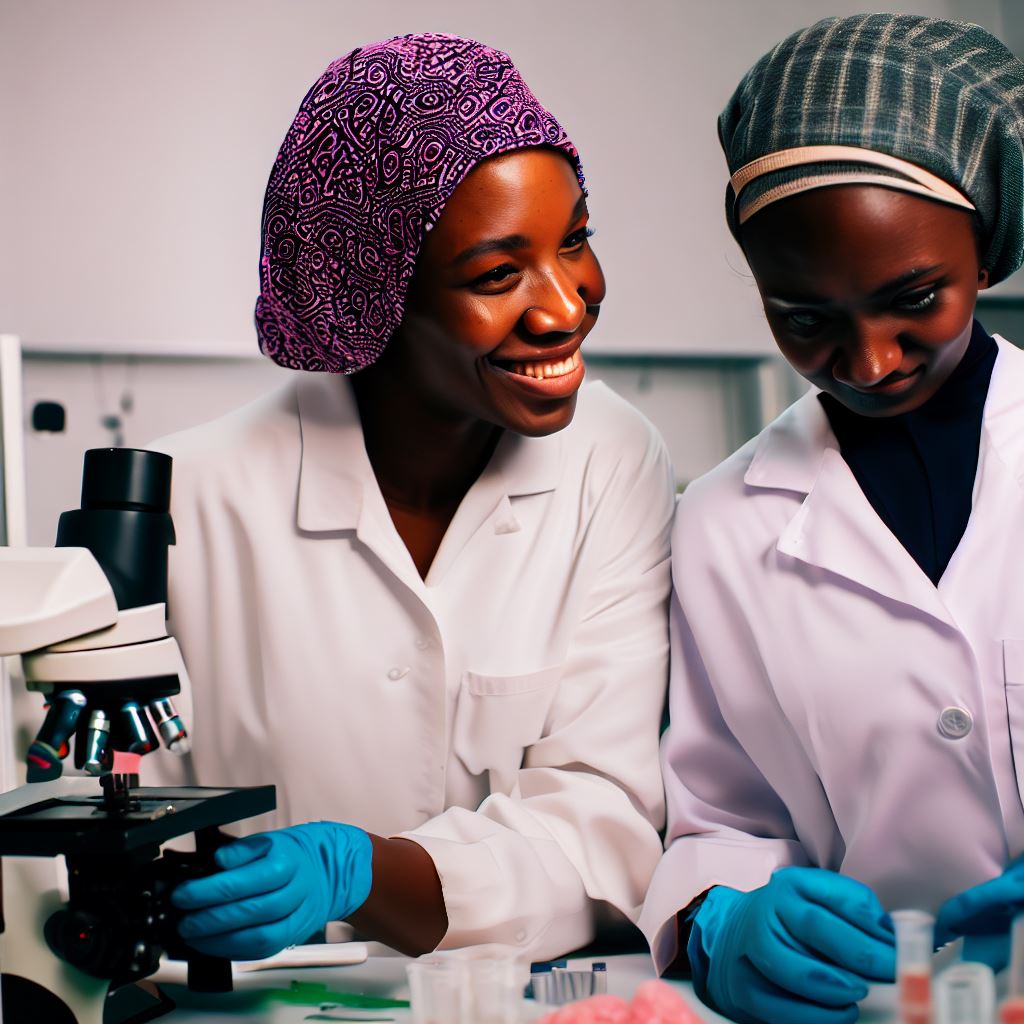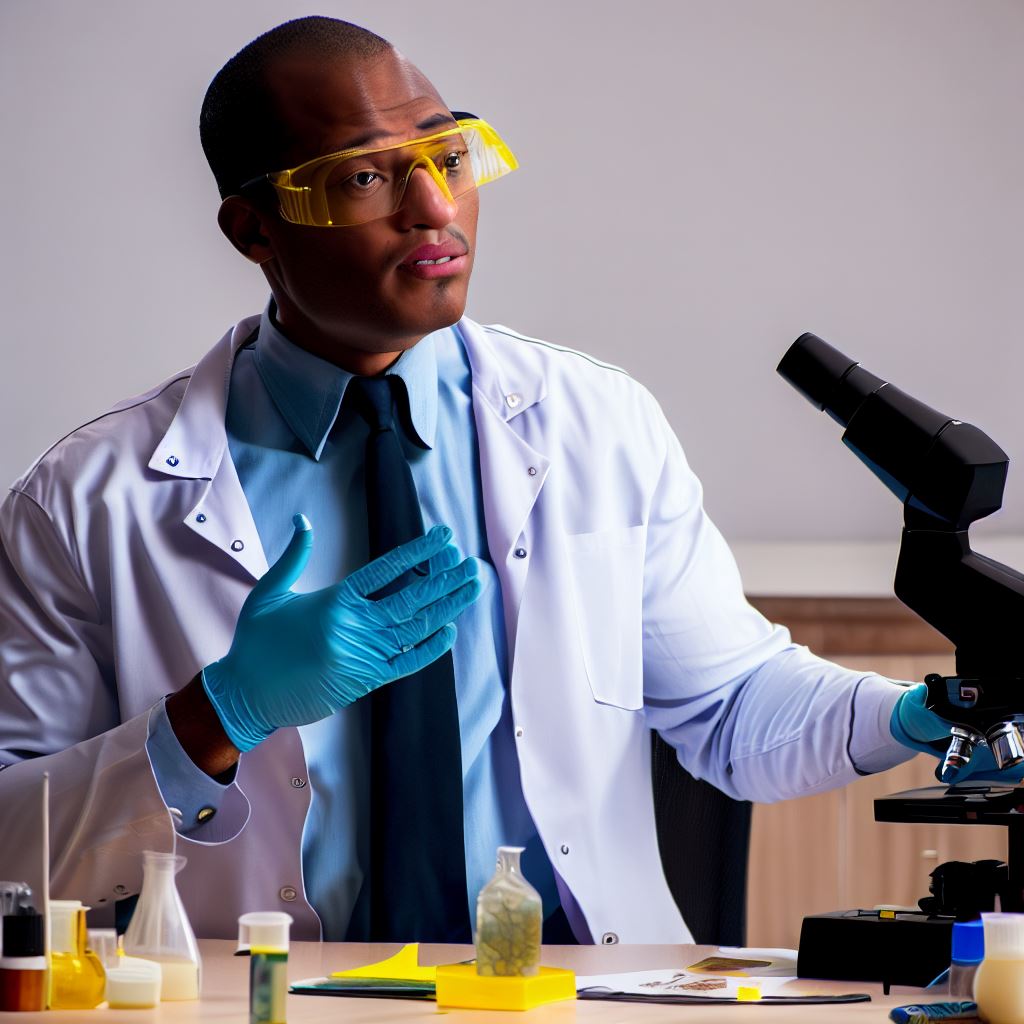Introduction
Forensic pathology plays a critical role in criminal investigations, and understanding the gender dynamics within this field is important.
In Nigeria, women pathologists are making significant contributions to forensic pathology.
This blog section will explore the topic of gender in forensic pathology in Nigeria, shedding light on the experiences and achievements of women pathologists in this challenging field.
Forensic pathology involves the application of medical knowledge to determine the cause, manner, and circumstances of death, particularly in cases with legal implications.
It serves as a crucial bridge between medicine and the law, providing critical evidence for criminal investigations.
In Nigeria, the field of forensic pathology has traditionally been male-dominated, but in recent years, women pathologists have broken barriers and entered the field.
Their inclusion has brought new perspectives and skills, contributing to the advancement of forensic investigations in the country.
This blog section aims to highlight the experiences of women pathologists in Nigeria, focusing on their achievements, challenges, and the impact they have made.
It will delve into their role in solving complex cases, improving victim identification, and bridging the gap in gender representation within the field.
By shedding light on the experiences of women pathologists in Nigeria, this section seeks to inspire and motivate more women to pursue careers in forensic pathology.
It also aims to promote gender equality and diversity within the field, ultimately leading to more comprehensive and effective criminal investigations.
Overall, this section will emphasize the significance of gender diversity within forensic pathology in Nigeria and recognize the invaluable contributions made by women pathologists in this vital field.
Historical Background of Forensic Pathology in Nigeria
Forensic pathology, the branch of medical science concerned with investigating the cause and manner of death, has a rich historical background in Nigeria.
The early development of forensic pathology in Nigeria
The early development of this field laid the foundation for its growth in the country.
During the colonial era, Nigeria’s medical system was primarily focused on providing healthcare services rather than forensic investigations.
It was not until the late 19th century that the need for forensic expertise became apparent, leading to the establishment of the first forensic pathology unit.
The pioneers of forensic pathology in Nigeria faced numerous challenges, particularly women pathologists who dared to enter this male-dominated field.
In those days, societal norms dictated that women should be confined to conventional medical specialties such as obstetrics and gynecology, and not venture into the realm of death investigation.
However, a few resilient women pathologists defied societal expectations and fought to make their mark in forensic pathology.
These trailblazers overcame countless obstacles, including gender bias and limited opportunities, to pursue their passion for unraveling the mysteries surrounding death.
One such remarkable woman was Dr. Clara Akintola, who became Nigeria’s first female forensic pathologist in the 1950s.
The challenges faced by women pathologists in entering this field historically
For centuries, women pathologists have faced significant hurdles in their pursuit of a career in this field.
Historically, gender bias and societal norms stifled their ambitions.
However, these remarkable individuals exhibited unwavering determination, gradually breaking down the barriers that had long restricted them.
One of the major challenges was the limited access to education.
In earlier times, women were often denied entry into medical schools.
Those who managed to gain admission were frequently marginalized and underestimated.
Nevertheless, these women persisted, proving their mettle through their dedication and brilliance.
Another hurdle lay in the scarcity of female role models and mentors in the field.
Without guidance and support, aspiring women pathologists had to forge their own paths, often facing isolation.
Current Status of Forensic Pathology in Nigeria
Forensic pathology in Nigeria has witnessed significant advancements and challenges over the years.
Currently, the field is gradually gaining recognition and importance due to its crucial role in the criminal justice system.
An update on the current state of forensic pathology in Nigeria
- Legal Framework: The absence of a comprehensive legal framework has hindered the growth of forensic pathology in Nigeria.
However, efforts are being made to develop and implement necessary regulations and guidelines. - Inadequate Infrastructure: One of the major challenges faced by forensic pathologists in Nigeria is the lack of adequate infrastructure.
Insufficient autopsy facilities, limited access to modern equipment and technology, and inadequate training programs hamper the progress of the field. - Shortage of Pathologists: Nigeria currently faces a shortage of forensic pathologists, which further strains the limited resources available for carrying out proper investigations and analysis.
This shortage hampers the effective functioning of the field. - Role of Women Pathologists: Women pathologists in Nigeria have made commendable contributions to the field of forensic pathology.
Their expertise and dedication have played a crucial role in advancing forensic investigations and ensuring justice is served. - Increasing Participation: Women pathologists are increasingly joining the field, bringing fresh perspectives and skills.
They have been instrumental in driving innovation, efficiency, and adding diversity to the forensic pathology workforce in Nigeria.
The role of women pathologists and their contributions to the field
Women have played a pivotal role in shaping the field of pathology through their relentless dedication and groundbreaking contributions.
From the early 20th century to the present day, female pathologists have been instrumental in advancing our understanding of diseases and improving diagnostic techniques.
Dr. Elizabeth Blackwell, the first woman to receive a medical degree in the United States, made significant strides in the pathology of infectious diseases.
Her research laid the foundation for our understanding of tuberculosis and typhoid fever. Dr. Gerty Cori, another trailblazer, was the first woman to win a Nobel Prize in medicine.
Her work in glycogen metabolism revolutionized our knowledge of metabolic diseases.
Dr. Mary-Claire King’s discovery of the BRCA1 gene transformed our understanding of hereditary breast and ovarian cancers.
Dr. Helen Brooke Taussig’s pioneering research on congenital heart defects has saved countless lives.
Read: Continuing Education for Biostatisticians in Nigeria
Gender Disparities in Forensic Pathology in Nigeria
In Nigeria, gender disparities within the field of forensic pathology exist and are concerning.
- Female pathologists are significantly underrepresented compared to their male counterparts.
- This lack of representation raises questions about the reasons behind such disparities.
The existing gender disparities within the field
Gender disparities within the field of forensic pathology have persisted for far too long.
While significant progress has been made in recent years towards achieving gender equality in various professions, this specialized field remains a glaring exception.
Forensic pathology, a critical branch of forensic science, requires meticulous investigation and examination of deceased individuals to determine the cause of death.
Yet, it’s disheartening to note that women are severely underrepresented in this field. According to recent statistics, only 30% of forensic pathologists are female.
This gender imbalance hampers diversity and innovation within the profession.
To address this issue, we must actively promote equal opportunities for women in forensic pathology.
Encouraging young girls to pursue careers in science and medicine, providing mentorship programs, and implementing policies that promote work-life balance can help bridge this gap.
The factors contributing to these disparities, such as societal norms and workplace culture
In the realm of forensic pathology, disparities persist, casting a shadow on the pursuit of justice.
These inequalities are deeply rooted in societal norms and workplace culture, perpetuating a system where justice is often elusive.
Societal norms play a pivotal role in these disparities. Biases surrounding gender, race, and socioeconomic status have infiltrated forensic pathology, affecting career opportunities and recognition.
Women and minority professionals often find themselves facing the glass ceiling, limiting their advancement in the field.
Workplace culture further exacerbates these issues.
Toxic hierarchies and outdated practices hinder collaboration and innovation.
A lack of diversity in leadership positions stifles fresh perspectives and perpetuates the status quo.
Read: Mining and Exploration: Roles for Geologists in Nigeria
Challenges Faced by Women Pathologists in Nigeria
In Nigeria, women pathologists pursuing a career in forensic pathology encounter specific challenges that hinder their professional advancement.
These challenges often stem from common obstacles and biases that persist in the field.
The specific challenges encountered by women in pursuing a career in forensic pathology
1. Gender Biases
- Women pathologists in Nigeria face gender biases, which lead to discrimination and lack of recognition.
- They often struggle to be taken seriously and face skepticism about their abilities due to traditional gender roles.
- Gender biases perpetuate the perception that women are not as competent or dedicated to their profession.
2. Cultural Expectations
- Cultural expectations place additional burdens on women pursuing careers in forensic pathology.
- Societal pressure to fulfill traditional gender roles hinders their professional advancement.
- Responsibilities related to marriage, child-rearing, and caregiving often disrupt career progression for women.
3. Limited Opportunities
- Women pathologists face limited opportunities for career growth and professional development.
- Gender inequality in the field restricts access to resources, grants, and research opportunities.
- They struggle to secure positions of leadership, as these roles are predominantly occupied by men.
4. Work-Life Balance
- Work-life balance remains a significant challenge for women pathologists in Nigeria.
- They often struggle to juggle demanding work schedules with familial obligations.
- The lack of support systems and flexible work arrangements further complicates their ability to prioritize personal and professional commitments.
- Lack of Mentorship
- The absence of female role models and mentors affects the career progression of women pathologists.
- Women often face a dearth of guidance, support, and encouragement to navigate the challenges they encounter.
- They lack mentorship opportunities that can provide insights into overcoming obstacles and advancing in their careers.
Common obstacles and biases faced by women pathologists and how they impact their professional advancement
1. Workplace Discrimination
- Women in forensic pathology experience workplace discrimination, including unequal pay and limited promotions.
- They face prejudice and biases, which hinder their chances of achieving professional success.
- Sexual harassment and gender-based violence are also prevalent issues faced by women pathologists.
2. Lack of Institutional Support
- The lack of institutional support is a major challenge for women pathologists in Nigeria.
- They often face barriers when it comes to securing funding for research projects or accessing necessary resources.
- Institutions need to prioritize creating supportive environments and policies that address gender-related challenges.
3. Cultural Stereotypes
- Societal stereotypes regarding women’s capabilities and roles perpetuate challenges faced by women pathologists.
- Women are often deemed unfit for certain roles, hindering their professional growth and advancement.
- Challenging such stereotypes is crucial to empowering women in forensic pathology.
4. Lack of Recognition
- Women pathologists in Nigeria often struggle to receive recognition for their contributions to the field.
- Their achievements and expertise are undervalued and overlooked due to gender biases.
- Recognition and acknowledgement of women’s capabilities are vital to promoting gender equality in forensic pathology.
Recognizing and tackling challenges confronting female pathologists in Nigeria can promote gender equality and support their professional advancement.
Read: Challenges Faced by Geologists Working in Nigeria Today

Success Stories of Women Pathologists in Nigeria
- Dr. Amina Ibrahim overcame obstacles to become the first female forensic pathologist in Nigeria.
- She has made significant contributions by performing autopsies and analyzing crime scene evidence.
- Dr. Ibrahim’s expertise has helped solve numerous complex cases, leading to convictions.
- Her determination and commitment have inspired aspiring female pathologists across Nigeria.
- Dr. Chika Okafor is another trailblazer, specializing in pediatric forensic pathology.
- She has pioneered research on child abuse and played a crucial role in bringing justice to victims.
- Dr. Okafor’s work has led to a better understanding of forensic science’s role in protecting children.
- Dr. Funmilayo Osunsanya is renowned for her expertise in forensic toxicology.
- Her meticulous analysis of toxic substances has provided crucial evidence in poisoning cases.
- Dr. Osunsanya’s work has saved lives and ensured justice for victims and their families.
- Dr. Ifeoma Ezeoke is a leading authority in forensic anthropology and human identification.
- Her groundbreaking research has advanced the field and helped identify countless unknown remains.
- Dr. Ezeoke regularly collaborates with law enforcement agencies to solve missing persons cases.
- Dr. Olufunke Ogunbode has become an icon in forensic histopathology and forensic genetics.
- Her expertise has aided in the identification and classification of various diseases and genetic disorders.
- Dr. Ogunbode’s work has revolutionized forensic medicine in Nigeria and beyond.
These women pathologists have shattered gender barriers and made immense contributions to forensic pathology.
They serve as role models for aspiring female pathologists in Nigeria, encouraging them to pursue their dreams and excel in the field.
Through their achievements, breakthroughs, and dedication, they have paved the way for a more inclusive and diverse forensic pathology community in Nigeria.
Read: Challenges Facing Forensic Pathology in Nigeria Today
Efforts to Promote Gender Equality in Forensic Pathology
Forensic pathology is a field that has traditionally been male-dominated, but efforts are being made to address gender disparities and promote gender equality within this profession.
Several initiatives and strategies have been implemented to create a supportive and inclusive environment for women pathologists in Nigeria.
Initiatives and strategies to address gender disparities in forensic pathology
- Mentorship Programs: One effective strategy to address gender disparities in forensic pathology is the establishment of mentorship programs.
These programs pair experienced female pathologists with younger women who are aspiring to enter the field.
Through mentorship, aspiring female pathologists can receive guidance, support, and career advice from experienced professionals, helping them navigate any barriers they may face. - Advocacy and Awareness: Another crucial initiative is advocating for gender equality and raising awareness about the importance of diversity and inclusivity in forensic pathology.
This involves engaging in discussions, organizing workshops, and conferences that focus on empowering and supporting women in the field.
By highlighting the achievements and contributions of women pathologists, these efforts challenge societal stereotypes and biases. - Encouraging Work-Life Balance: Creating a supportive environment that recognizes the importance of work-life balance is essential to attract and retain women in forensic pathology.
Flexible work arrangements, such as part-time positions or job-sharing opportunities, can enable women to pursue their careers while also fulfilling family responsibilities.
Additionally, providing parental leave and on-site childcare facilities can further facilitate work-life balance for pathologists who are also mothers. - Equal Opportunities and Promotions: Ensuring equal opportunities for career advancement is crucial in promoting gender equality in forensic pathology.
It is essential to establish transparent and unbiased criteria for promotions and job assignments.
By implementing fair evaluation systems, women pathologists can be recognized and rewarded for their skills and achievements, ultimately narrowing the gender disparity gap. - Networking and Professional Development: Creating networking opportunities and fostering professional development within the field is vital for women pathologists.
Organizing conferences, seminars, and workshops specifically aimed at women in forensic pathology can help cultivate a sense of belonging and support.
These events provide a platform for women pathologists to share experiences, exchange ideas, and form valuable connections.
The importance of creating a supportive and inclusive environment for women pathologists
In the world of pathology, where precision and expertise reign supreme, it is paramount that we recognize the significance of creating a supportive and inclusive environment for women pathologists.
Active participation in this endeavor is essential for the growth and success of our field.
Supportive environments empower women pathologists to thrive.
They encourage open dialogue and collaboration, allowing for the free exchange of ideas and knowledge.
When women feel supported, they are more likely to take on leadership roles, contribute groundbreaking research, and mentor the next generation.
Inclusivity is equally crucial.
It ensures that diverse perspectives are heard and valued.
An inclusive environment not only promotes gender equality but also enhances the overall quality of healthcare and research.
It challenges biases and fosters a culture of respect.
Explore Further: Nigeria’s Role in Global Photonics Technology
Recommendations for Improving Gender Inclusivity in Forensic Pathology
Gender inclusivity is crucial for the advancement and progress of any field, including forensic pathology.
In order to foster gender equality in this domain.
Practical suggestions for fostering gender equality in the field
- Promote equal opportunities for women in forensic pathology through targeted recruitment efforts.
- Encourage organizations and institutions to establish mentorship programs that support female pathologists.
- Implement policies that address gender bias and discrimination within forensic pathology departments.
- Provide flexible work arrangements to accommodate the needs of both women and men in the field.
- Offer professional development training specifically focused on gender equality and diversity.
- Engage in outreach programs to actively encourage young girls to pursue careers in forensic pathology.
- Adopt a zero-tolerance policy for harassment and discrimination, ensuring a safe working environment for all.
- Encourage female pathologists to become advocates and role models for future generations.
- Engage in ongoing research to examine the barriers and challenges faced by women in forensic pathology.
- Collaborate with international organizations and societies to share best practices and lessons learned.
The role of education, mentorship, and policy changes in promoting inclusivity
Education plays a significant role in promoting gender inclusivity in forensic pathology.
By incorporating curriculum that emphasizes the importance of diversity and equality, educational institutions can shape future pathologists’ understanding of the field.
Additionally, teaching about gender biases, stereotypes, and their detrimental effects can help eliminate discriminatory practices from the outset.
Mentorship also plays a crucial role in fostering gender inclusivity.
Establishing mentorship programs that pair experienced female forensic pathologists with aspiring professionals can provide invaluable guidance, support, and networking opportunities.
Such programs can help women navigate the challenges and obstacles they might encounter in their careers, ultimately enhancing their success and representation within the field.
Policy changes are necessary to address systemic biases that hinder gender inclusivity.
Forensic pathology departments should develop and enforce policies that promote equal opportunities, fair treatment, and nondiscriminatory practices.
These policies should not only address gender disparities but also ensure that all individuals are evaluated based on their skills, knowledge, and qualifications rather than their gender.
Moreover, the involvement of professional societies and organizations is crucial in promoting gender inclusivity in forensic pathology.
These institutions can establish committees and task forces dedicated to addressing gender inequalities, conducting relevant research, and advocating for policy changes.
By actively involving all stakeholders, progress can be made towards achieving gender parity in the field.
Fostering gender inclusivity in forensic pathology requires a multi-faceted approach.
It is essential for organizations, institutions, and individuals to work collectively towards creating an inclusive environment that benefits both women and men in forensic pathology.
You Might Also Like: A Day in the Life of an Optical Tech in Nigeria
Conclusion
This blog section has highlighted the experiences and achievements of women pathologists in Nigeria’s forensic pathology field.
Throughout the post, we examined the challenges faced by these trailblazing women and the significant contributions they have made.
By showcasing their accomplishments, we hope to inspire more women to pursue careers in forensic pathology and related disciplines.
Gender equality is crucial in this field, as it brings diverse perspectives and approaches to the criminal justice system in Nigeria.
Increased representation of women ensures a more effective, fair, and inclusive process of analyzing and solving crimes.
Publish Your Professional Profile, Business or Brand
Showcase your expertise, gain trust, and boost visibility instantly on Professions.ng.
Publish NowIt is essential for the Nigerian government and relevant institutions to address any barriers that hinder women from thriving in this profession.
By creating equal opportunities and providing support to women pathologists, Nigeria can tap into the full potential of its forensic pathology field.
Ultimately, gender equality in forensic pathology will contribute to a stronger criminal justice system, ensuring justice for all in Nigeria.




